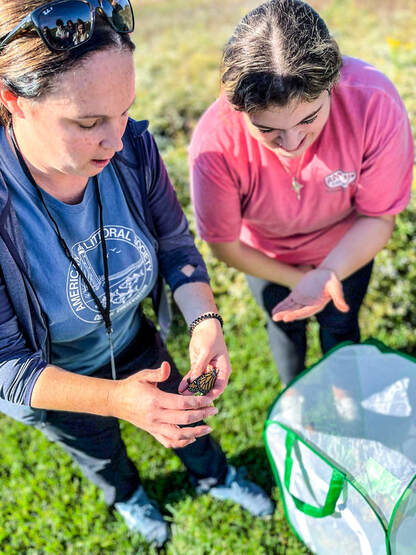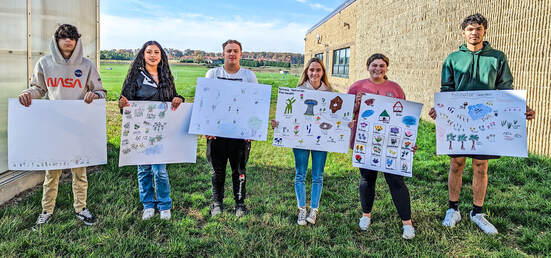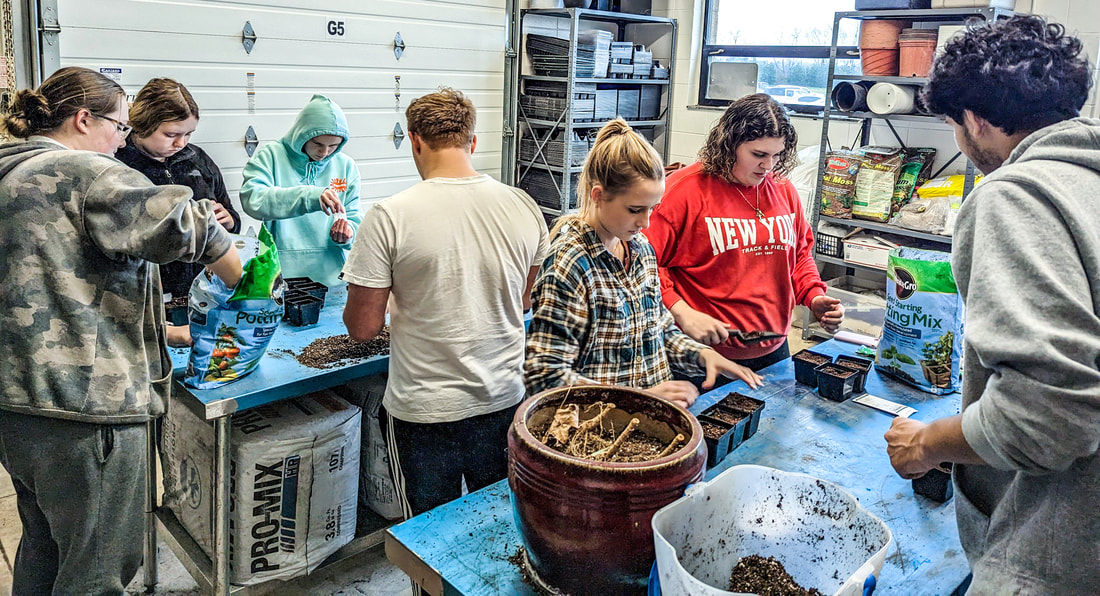|
Littoral Society Kicks Off Environmental Stewardship Program with Students at South Jersey High School Over the past 5 months, students in Agriculture Research and Development and Animal Science classes at Cumberland Regional High School (CRHS) explored the impacts of climate change and habitat loss on pollinators while getting their hands dirty in an environmental stewardship project led by the American Littoral Society. The project, called Helping Pollinators Help Us: Creating Habitat for Climate Change Resilience, was launched in the Fall of 2022 with funding from the National Oceanic and Atmospheric Administration Planet Stewards program (NOAA). The pollinator project at CRHS is led by Nicole Smith, the school's Agriculture Teacher and FFA Assistant Advisor, and Michelle Rebilas, Littoral Society’s Delaware Bay Education Coordinator. For the two-year project, students will be engaged in hands-on conservation and stewardship experiences that build skills and confidence in their individual and collective ability to make a difference in their community. As part of that they learned about the threats to pollinators like bees and butterflies in the face of climate change and developed a strategy to increase pollinator habitat availability and connectivity on their school campus. The initial semester of work included three phases: Pollinator Study & Monarch Conservation, Habitat Planning & Design, and Growing Pollinator Plants in a Greenhouse. The project will culminate with the creation of a 1-acre pollinator habitat on the campus of Cumberland Regional High School in Spring 2023.  During the study phase, students examined the importance of pollinators and their vital role in our ecosystem and had the opportunity to witness the fascinating life cycle of the monarch butterfly by raising monarch caterpillars in their classroom. They also learned about the great monarch migration, that Cumberland County, NJ is positioned directly in the flight path of the monarch’s 2500-mile journey along the Atlantic Coast to Mexico, and that North America's migratory monarch population has fallen 80% from 2000 – 2020. That population collapse has been driven in large part by deforestation, urban development, and the use of pesticides and herbicides. Plant-killing chemicals have led to a dramatic decline in wild milkweed, the only plant that monarch butterfly larvae feed on. As a result, students went into the habitat planning and design stage aware that their school pollinator habitat would need to include those flowering plants. They capped the first phase of study by successfully rearing 12 monarch caterpillars to emerge as butterflies for release! The second phase of the project was habitat planning and design. Students chose a pollinator species of interest and researched that species to determine its habitat requirements.  Students then created posters to showcase their habitat design and shared information with the class about their chosen pollinator. A winning design was chosen by peer and teacher votes and will be incorporated into the future pollinator habitat installation. Finally, students planted seeds in the school green house to begin growing the plants for their future habitat. The native species planted by the students included black-eyed Susan, milkweed, purple coneflower, and wild bergamot. Once potted, the seeds were cared for by the students during their regular class period. The next steps of this project are to continue to engage students, grades 9-12, in the on-going environmental stewardship project at CRHS through Spring of 2024. Students will be planting the new pollinator habitat on campus, creating a video project to share their work with the community, and organizing a community planting event at a local restoration site. Over the past 5 years, the Littoral Society and CRHS have worked together to develop the next generation of environmental stewards in Cumberland County. Past projects on the school’s campus include a rain garden to filter stormwater runoff from the sports fields and a 4 acre tree planting that helps to protect their local stream from pollution. This next phase of the partnership aims to address the decline of pollinators by increasing habitat connectivity and enhancing areas that support pollinators in order to create a more resilient wild pollinator population in the face of climate change. NOAA's Planet Stewards is a national program providing resources to educators so they can build scientifically literate communities and engage in stewardship activities in response to environmental challenges (noaa.gov/education). Comments are closed.
|
Archives
July 2024
Categories
All
|


